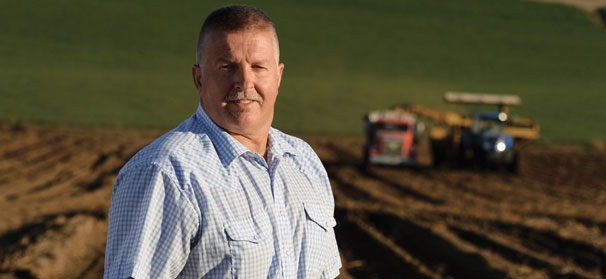
Loving the Farm Life
The sky was a crystalline blue, unmarred by even the wisp of a cloud, in the early light of a late September morning. Truck traffic was racing down the undulating two-lane blacktop of Highway 17 as windrowers and harvesters warmed up in the fields in preparation for another day of the 2015 potato harvest in eastern Washington’s Columbia Basin.
For Mike Pink of Mesa, Washington, farming is a labor of love, and this time of year represents the culmination of another season of hard work.
Pink, the 2016-2017 chairman of Potatoes USA, didn’t grow up on a farm but spent much of his youth living and working on farms.
I grew up around the farm and always worked on the farm, and growing up as a kid I was always on the farm as much as possible,” Pink said.
“My grandparents farmed and my uncles farmed, but my mom and dad did not farm,” he said. “My dad was a carpenter by trade, worked out at the Hanford nuclear reservation, and my mom was a bookkeeper.”
His grandparents raised sugar beets and grain, and he recalls with nostalgia working on their farm as a teenager.
Click on an image to see the full grower profile photo gallery.
“I remember the days when air conditioning and AM radio, that was the high life, and when we got AM/FM radio that was even better,” Pink said.
“I got a chance to help work harvest one fall and I really enjoyed that and kind of got hooked on it,” Pink said. “I think any potato farmer will tell you it’s like a bad drug, you get hooked on it and you can’t get away from it. It’s like an addiction.”
He started growing potatoes in 1987, while working on an ag business degree at Columbia Basin Community College, by leasing 34 acres from his cousin Manton Bailie. He ended up selling his first crop to Simplot.
The tuber addiction has grown into a 1,200-acre habit of Umatillas and Rangers that Pink grows for Lamb Weston and McCain, with another 1,300 acres in rotation crops.
He and his wife, Davina, have been married for almost 23 years and are the parents of three daughters. Danika, 20, is studying animal science at Washington State University; Darbi, 18, is a senior at Chiawana High School; and Delaney, 13, is in the seventh grade at McLoughlin Middle School.
Pink owns some ground, but the majority of the land he farms is rented. He rents his shop, located on his grandparents’ property, from his grandmother.
Pink said that he has relied on long-term contracts with his landlords. He has been farming some of the ground for almost 20 years.
Land values have been increasing, with a lot of pressure coming from investment companies and agricultural concerns from California moving into the area, he said. The California growers are moving north to take advantage of the abundance of water available in the Columbia Basin.
“We’ve had a lot of pressure from investment groups, and once they buy the land the farmer will never get it back,” Pink said. “I would rather see my neighbor buy a piece of land instead of an investment group, just because I know that it’s going to stay, hopefully, in the family farm.”
According to Pink, the 2015 season was the hottest on record in the Columbia Basin, resulting in a crop of erratic quality.
“Our heat came really early,” he said. “It came in June, where it usually doesn’t come until July and August. I think we had three weeks where it was over 100 ̊ F every day, and we just didn’t cool off at night like we normally do around here, so it really affected things.”
With the U.S. Potato Board’s recent name change, Pink becomes the first chairman of Potatoes USA, in his 12th and final year of service in the organization. He previously served two three-year terms, with a one-year interlude, followed by two more three-year terms.
It was time for a name change, Pink said.
 “I believe that we needed to come up with something new,” he said. “We’re not promoting the board, we’re promoting potatoes – and USA potatoes, specifically.”
“I believe that we needed to come up with something new,” he said. “We’re not promoting the board, we’re promoting potatoes – and USA potatoes, specifically.”
The changes that Blair Richardson, Potatoes USA president and CEO, has made since taking the helm in 2013 have reduced redundancy and improved efficiency in the organization, he said.
“The same people now are working on the same programs on international as they are on domestic, and now we’re bringing those ideas from international to domestic and vice versa,” Pink said.
He cited the Spud Nation food truck and the salad bar initiative as two programs that have created a lot of buzz, not only in the potato industry but throughout the foodservice industry.
“We have a lot going on and everybody’s extremely excited,” Pink said. “What we have to do now is to make sure these new programs are implemented correctly and that we don’t stumble along the way.”
He admits that it’s going to take some time to get used to the name change and refrain from calling it “the board,” while expressing enthusiasm at the year ahead as its chairman.
“I have seen so much change on what used to be the board and is now Potatoes USA,” Pink said. “I can’t wait to see what this year holds for us.”
See more photos from the July/August grower profile on Flickr.












